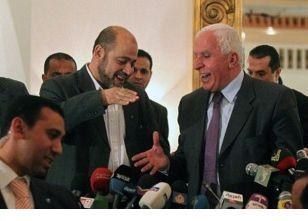The Palestinian Authority and the Palestinian resistance Hamas have reconciled after years of conflict, agreeing to form a national unity government that prepares for elections and rebuilds Gaza.
A complete transformation has hit the Middle Eastern region to provide its people with hope to surpass difficulties that have been plaguing them for decades.The atmosphere of revolution and change has hit various spots in the region and reached Palestine that chose to revolt against the ruling occupier that imposes his will, settlers, and settlements in arrogant and violent methods.

Despite the deep gap between their strategies, policies, plans and allies, both parties were able to put all the differences behind and reconcile, for the sake of their dispersed land, and to give the people their right to choose and decide.
“The two sides focused on procedural methods in their reconciliation meeting, like methods of forming the Supreme Committee for elections, the electoral court, the Supreme Security Committee, the election’s date and the establishment of the government, Palestinian Political analyst Majed Azzam said.
In an interview with Al Manar news website, Azzam assured that “the political differences were all left behind and the focus during the meeting was over administrative approaches to ending the conflict, building the Gaza strip, and handing the final decision to the people”.
 “The reconciliation stipulates two main points. First is in Gaza, where there will be pacification that should be used to reconstruct and settle national Palestinian issues. Second is in Ramallah, as the authority there is convinced that it has reached a dead-end with the Israelis and that there won’t be any negotiations in the near future”, Azzam told Al Manar.
“The reconciliation stipulates two main points. First is in Gaza, where there will be pacification that should be used to reconstruct and settle national Palestinian issues. Second is in Ramallah, as the authority there is convinced that it has reached a dead-end with the Israelis and that there won’t be any negotiations in the near future”, Azzam told Al Manar. He pointed out that “Palestinian president Mahmoud Abbas has recently expressed despair from US President Barak Obama, and considered that the United States neither puts serious pressure on Israel, nor works on ending the Palestinian crisis”.
According to the Palestinian political analyst, who seemed optimistic with this reconciliation, “the revolution in Egypt and the change of regime was one of the reasons that led to this successful step, as “now there is a serious and significant role for Egypt, as the main barrier back then was the absence of trust between Hamas and the Egyptian government”.

“Furthermore, the revolutions in the Arab world, the thought of referring to the public opinion, and the execution of free and just elections, are factors that will give further success to this reconciliation.
The Israeli and the US stances that rejected this internal agreement, and will work on obstructing it, will not affect the renewed national unity as the regional developments have proved their declined and limited influence in the region”, Azzam added.
On its part the Zionist entity received the news with shock and concern and immediately unleashed threats and condemnations.
Israeli PM Benjamin Netanyahu demanded Abbas to choose peace either with Israel or with Hamas. However, the PA responded right away favoring national unity over an occupying settlement constructer.
Azzam assured that Netanyahu’s speech was arrogant and interfered in internal Palestinian affairs.

Furthermore, he said “Netanyahu tried to portray Israel as the good and peaceful, and Hamas as well as the Palestinian people as evil, neglecting the fact that he has been in post for two years and so far failed to achieve any settlement. The entire world is aware that Netanyahu does not want peace”.
“We cannot imagine a government that has Netanyahu, Lieberman and Barak to be a peaceful one; they only seek surrender from the Palestinians”, the Palestinian analyst pointed out.
Zionist newspaper Haaretz reported Thursday that this reconciliation could serve Israel in obstructing the United Nation’s declaration of a Palestinian state in September, as these “renewed relations between Hamas and Fatah could shed a different light on Abbas' intentions, and Netanyahu, who is due to speak before both houses of Congress next month, will be able to present the agreement as proof that Abbas doesn't really want peace”.
Azzam assured that any step Netanyahu would take to benefit from this new situation will fail.
“He is not capable of persuading 130 states against recognizing a Palestinian State with Al Quds as its capital. After coming out in September, this resolution could face various challenges, but let us not forget that Lebanon’s resolution 425 came out in 1978, however it was not implemented until year 2000 with the efforts of the wise resistance at the political, media and economics levels”, he said, pointing out that “the resolution in September will be the beginning of a renewed battle for Israel on various fronts”.
